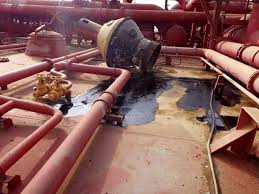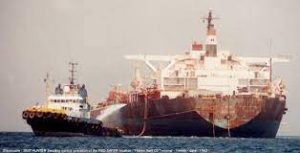Russian Crude at Discount
With the increase in ocean borne trade and vessels the incidents of blasts and spills have correspondingly increased at ports and coasts. Although the maritime sector is relatively regulated rising costs of insurance of ships lets inspections and survey of ships worthiness slip in some jurisdictions. The shipping sector has witnessed significant disruption of the food and energy security supply chain in the times of the pandemic. While shipping lines made record profits post COVID-19 the conflict in Ukraine threw world energy and food trade into turmoil. The UN had to broker a grain deal from the Black Sea grain silos as many developing countries were desperately awaiting supply of grain shipments. On account of sanctions Russian origin hydrocarbon cargo movement considerably reduced with China and India picking up the slack and acquiring Russian crude at heavy discounts.
Suez Canal Blockage
In the recent past the vessel Ever Given blocked the Suez Canal for more than a week and global maritime trade was disrupted with estimates placing the hourly loss to shipping trade at more than $ 400 million.
Lebanese Port Blast
The Russian owned Moldovan flagged cargo ship MV Rhosus, with a cargo of ammonium nitrate, sailed from the port of Batumi in the year 2013 and during the voyage due to engine malfunction, arrived at Beirut port. The ship was found to be defective and the port authorities of Beirut impounded the cargo which was transferred to a warehouse in the port. The blast in the year 2020 decimated several blocks in the vicinity. In hindsight, at a small cost, the owners of the ship could have been directed or advised to remove the ship with its cargo and saved precious human lives and prevented colossal damage to the port infrastructure.
Potential Ecological and Humanitarian Disaster
 Courtesy The Arab Weekly
Courtesy The Arab Weekly
The conflict in Yemen may indirectly cause the converted aging supertanker FSO Safer , in an advanced state of decay , to spill its cargo of crude in the Red Sea and the spill could drift to the coastline of Yemen, Djibouti, Eritrea and the Red Sea Development megaproject and high end tourist resorts along the North Western coast of Saudi Arabia. Mines set adrift by the rebels are a constant threat to the ship. Compounding matters are that attached to the tanker is an oil pipeline extending almost 4.8 miles to the Yemeni oil export facility , the ships hull is corroding and the liquid fuel cargo slightly above 1 million barrels of oil ( 140,000 tonnes) can spill as well as the more then 15,000 barrels of crude in the subsea pipeline . The engine is beyond repair and has been flooded by seawater. The system for pumping inert gases into the oil chambers to prevent sparks has become non-functional. The eruption of the conflict in Yemen eight years back delayed the decommissioning of this floating oil terminal . Although 15,000 barrels have evaporated and polymerisation taken place the liquid cargo can directly spill into the Red Sea if the hull corrodes further or in the event of a blast. The spill would be the fifth worst spill in history. Any eventuality of spill would cause a severe disruption to shipping routes through the Suez Canal with ships being forced to divert around the Cape of Good Hope to avoid steaming through the spill.
Incalculable Damage to Coral Reefs
 Courtesy Greenpeace
Courtesy Greenpeace
The spill would damage the Southern Red Sea pristine coral reefs and fragile coastal wetlands such as mangroves and decimate this known temperature resistant coral reef system. The ecological disaster would be catastrophic.
UN intervention
Yemen, already reeling under war may have its desalination plants on Yemen’s coast at the ports of Hudaydah, Salif and Aden affected with a potential interruption of drinking water supply. If ships cannot sail through this sector the major portion of aid would be blocked and around 10 million Yeminis deprived of foodstuff and face famine. The livelihood of 15 % of Yemini’s is based on shipping and the marine species would be eliminated in an oil spill of this magnitude driving the fishing community into poverty. The cost of cleanup of any spill would run into billions of dollars.
Humanitarian Disaster
The UN intervened in the year 2022 and hammered out an agreement with the Yemini rebels whereby the UN would charter a VLCC for the purpose of transferring the oil to a tanker in seaworthy condition and a double hull till such time that the oil could be disposed and sold as the case may be. The tanker was to replace the FSO Safer and the UN arranged funding of around $80 million but the terms of the arrangement got scuttled on account of surge in VLOC cost and a dip in global oil prices which was the basis of valuing and funding of the oil transfer expenses. The UN has issued a flash appeal to the public for contributions to bridge the funding gap. It is astonishing that despite having a budget of more then $ 3 billion for the current financial year the UN cannot arrange this meagre fund.The UN and the maritime nations need to get involved and take timely measures to avoid and eliminate the likelihood of the spill or else a maritime catastrophe is waiting to occur at any time
By Nadir Mumtaz

Leave A Comment